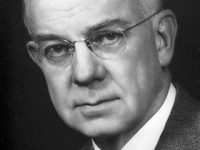
Albert Camus (1913-1960)
On November 7, 1913, French Nobel Prize winning author, journalist, and philosopher Albert Camus was born. His views contributed to the rise of the philosophy known as absurdism in opposition to Nietzsche‘s nihilism [7] and Sartre‘s existentialism.[6]
Albert Camus – Early Years
In was somehow a miracle that Albert Camus became one of the finest writers of the 20th century and a Nobel laureate. Albert Camus was born in extreme poverty in a remote corner of the French colony Algeria, where his father Lucien Camus was employed as a labourer in a vineyard. Not even a year later, the first World War started, and Lucien Camus was killed in the first weeks of the war at the Battle of the Marne. Camus’s mother was the daughter of Spanish immigrants, was half-deaf and suffered from a speech impediment. She cleaned houses to support her two sons, who grew up in a two-room flat in Belcourt without bathroom, heat or plumbing, a working-class district of Algiers.
In 1923, Albert Camus was accepted into the lycée on the base of a scholarship and eventually he was admitted to the University of Algiers. After he contracted tuberculosis in 1930, he had to reduce his studies to part-time. To earn money, he also took odd jobs: as private tutor, car parts clerk and assistant at the Meteorological Institute.
“I was born poor and without religion, under a happy sky, feeling harmony, not hostility, in nature. I began not by feeling torn, but in plenitude,” (Albert Camus, in 1948).
Political Journalism
In 1936, Camus received his master diploma. One year earlier, he had already joined the French Communist Party, seeing it as a way to “fight inequalities between Europeans and ‘natives’ in Algeria.” Camus joined the activities of the Algerian People’s Party, which got him into trouble with his Communist party comrades who expelled him. In 1934 Camus married Simone Hié, a morphine addict, but the marriage ended as a consequence of infidelities on both sides in 1936. At age 26, he came to France. This same year the German army invaded France. Camus joined the resistance movement during the occupation and after the liberation was a columnist for the newspaper Combat, a clandestine resistance cell and newspaper that had been founded in 1942 for underground intelligence and sabotage. In 1947 Camus retired from political journalism and, besides writing his fiction and essays, was very active in the theatre as producer and playwright.
“This heart within me I can feel, and I judge that it exists. This world I can touch, and I likewise judge that it exists. There ends all my knowledge, and the rest is construction.” (Albert Camus)
Philosophical Absurdism
During the war, Camus published a number of works which have become associated with his doctrine of the absurd: his idea it is impossible to make rational sense of one’s experience, and human life is made meaningless by mortality. The novel, The Stranger (1942), has become the quintessential work of fiction of the 20th century on the theme of the alienated outsider. The Myth of Sysiphysus, published in the same year, is an essay dedicated to the absurd. Moreover, he also published two plays consistent with this theme: Cross Purpose (1944) and Caligula (1944). Albert Camus was not comfortable with the moral indifference necessarily implied by philosophical absurdism, and his political history and experiences in occupied France led him to search for a way to address moral responsibility.
What makes Camus Different
What makes Camus different from other existentialists and modern philosophers is his fascination for and acceptance of contradiction. Camus didn’t like Paris. He didn’t like most of the people whom he thought were phonies and dreadful thinkers. His allegory, The Plague, was published in June, 1947, and was immediately cited as a major literary work. The story is a symbolic novel in which the important achievement of those who fight bubonic plague in Oran lies not in the little success they have but in their assertion of human dignity and endurance. The critics and the public were unanimous in their praise for this somberly narrated chronicle.
“At the heart of all beauty lies something inhuman, and these hills, the softness of the sky, the outline of these trees at this very minute lose the illusory meaning with which we had clothed them, henceforth more remote than a lost paradise… that denseness and that strangeness of the world is absurd.” (Albert Camus)
The Rebell
In 1949, upon his return to France from a South American tour, Camus became quite ill and went into almost total seclusion, only occasionally publishing collections of more of his political essays. In 1951, when he was recovered, he published an extensive study of metaphysical, historical, and artistic revolt, The Rebel. It was an extremely controversial book and was responsible for breaking the friendship between Camus and Jean Paul Sartre.
Nobel Prize and Fatal Accident
In 1957, Albert Camus was awarded the Nobel Prize for Literature and two years later he was dead, killed in an automobile accident on January 4, 1960. The many eulogistic essays which appeared afterward remarked on the absurdity of his death – its suddenness, its uselessness, and the lack of logic to explain why.
Albert Camus, Lecture 1: Philosophical Suicide and The Absurd, [9]
References and Further Reading:
- [1] Albert Camus – The Nobel Prize in Literature, 1957 – at nobelprize.org
- [2] The Albert Camus Society in the UK
- [3] The Works of Albert Camus at openlibrary.org
- [4] Radio feature about Albert Camus, from BBC 4 – In Our Time
- [5] Albert Camus at the European Graduate School
- [6] A Writer should not Allow Himself to be Turned into an Institution – Jean-Paul Sartre
- [7] God is Dead – The Philosophy of Friedrich Nietzsche
- [8] Albert Camus at Wikidata
- [9] Eric Dodson, Albert Camus, Lecture 1: Philosophical Suicide and The Absurd, Eric Dodson Lectures @ youtube
- [10] Amin, Nasser (2021). “The Colonial Politics of the Plague: Reading Camus in 2020”. Journal of Contemporary Development & Management Studies. 9 Spring 2021: 28–38.
- [11] Aronson, Ronald (2017). “Albert Camus”. In Edward N. Zalta (ed.). The Stanford Encyclopedia of Philosophy.
- [12] Nicholson, Graeme (1971). “Camus and Heidegger: Anarchists”. University of Toronto Quarterly. 41: 14–23.
- [13] Brisville, Jean-Claude (1959). Camus. Gallimard.
- [14] Timeline for Albert Camus, via Wikidata





